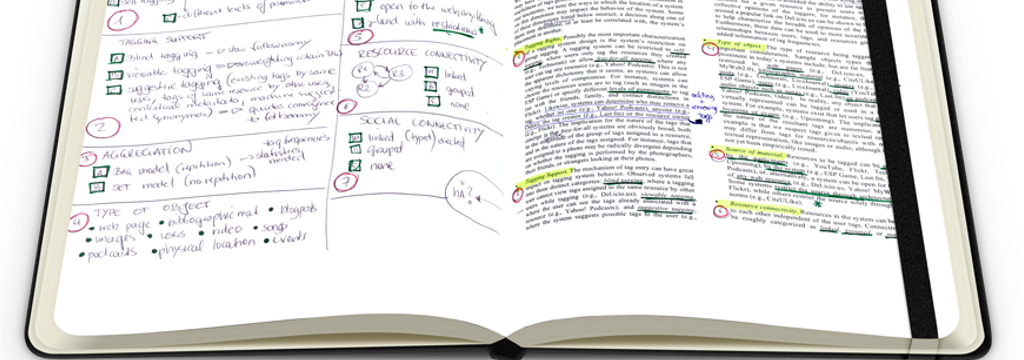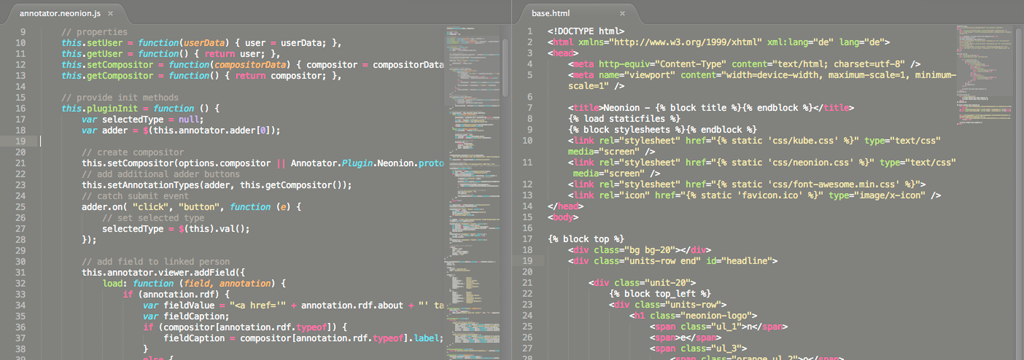-

Annotating Text
Use neonion to manage relevant text documents and annotate them intuitively.
-

Annotating Together
Use neonion to annotate documents on your own or together with a group.
-

Available on GitHub
neonion is open source and available for download on Github.
Collaborative Semantic Annotations
neonion is a user-centered, web application for the collaborative annotation of texts developed at the Human-Centered Computing group at Freie Universität Berlin.
neonion supports semantic annotations and open standards but does not presuppose any knowledge about the technologies involved. It is the perfect fit for people who want their annotations to be exchangeable between different tools and projects. Moreover, your annotations can be connected to the linked data cloud.
neonion will provide several machine annotation processes (such as named entity recognition). Thus, it enables users to focus on real challenges while they can delegate necessary standard tasks to the machine. Our vision is to build an annotation application in which the human user and the machine work hand in hand to make your annotation tasks effectiv, efficient, and satisfying.
At the moment, neonion is developed together with scholars from the Humanities (esp. from the Max Planck Institute for the History of Science) by applying a user-centered design approach. This allows us to develop our tool closely with the prospective users, so that we reply to their needs directly. Thus, we ensure an intuitive utilization of neonion, either in the area of the Humanities or beyond. You can start working with neonion immediately after installing it.
neonion assists users by offering an intuitive web GUI for manual annotations, a document management tool, integrated machine annotation tools, and the possibility to share annotations and work collaboratively in teams.
neonion is open
neonion is open source and available on Github. neonion is based on open standards such as REST and RDF, libraries such as the javascript library Annotator, as well as frameworks such as Django and Flask.
neonion is semantic
All data in neonion is stored in a semantic way using W3C's RDF standard. Thus, the knowledge encoded in the annotations can be connected to external knowledge and it can be used to reason about.
neonion is collaborative
Users of neonion can easily work together on shared documents. Annotations can be private, shared in a group or can be even made visible for public so that created knowledge can become part of the web of data.
Technology
The neonion backend combines several open frameworks and standards. It is based on concepts of the semantic content authoring software loomp, developed by the research group Networked Information Systems at the Freie Universität Berlin since 2009. The neonion server is build using the Python web framework Django. neonion realizes a REST interface to allow third parties to consume annotations.
For storing the annotations we use a Flask annotation store shipped with Annotator in combination with the semantic triple store Sesame. Through this combination neonion supports fast and easy access to rich meta-information regarding the annotations as well as semantic knowledge regarding the content of the annotations. Semantic content is encoded using RDF, the Resource Description Framework. It is thus compatibel with knowledge in the Web of Data and accessible using SPARQL.
The intuitive user interface adopts the functionality of Annotator. It is extended by a new plug-in that supports semantic annotations developed by the neonion team. neonion offers an pre-built interface to the free knowledge base wikidata.
Demo
Give it a try at our demo website.
You can find the user manual that explains step by step how to get started with neonion.
Team
neonion is developed by the human-centered computing group led by Prof. Claudia Müller-Birn. The group belongs to the Computer Science Department at Freie Universität Berlin, Germany.
